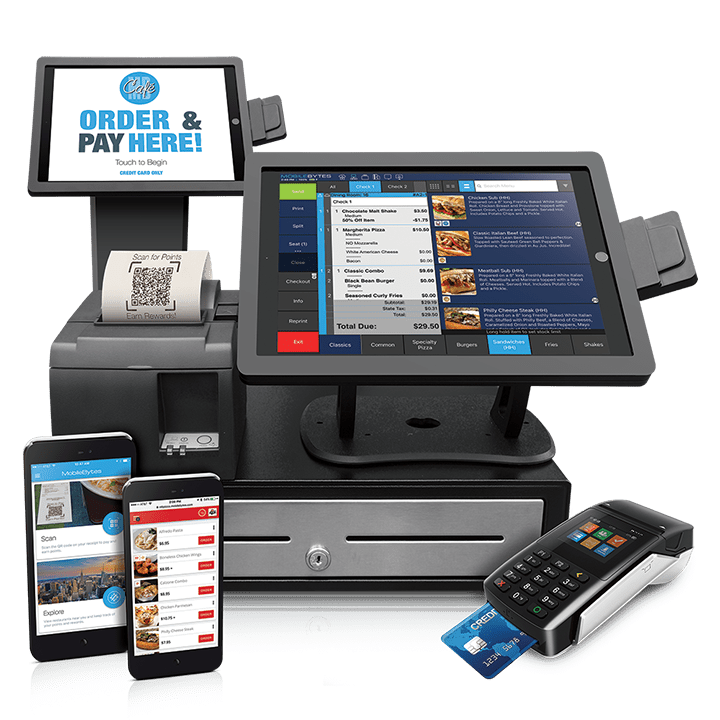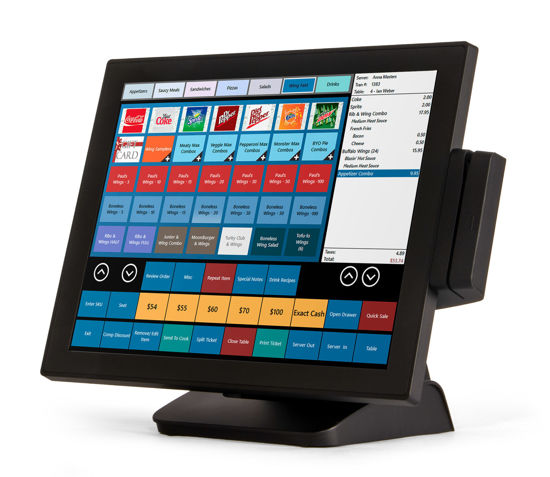Restaurant Pos - Questions
Restaurant Pos - Questions
Blog Article
Some Known Details About Pos Machine

POS Systems: Retail Point-Of-Sale Solutions Streamline Deals
The smart Trick of Pos Machine That Nobody is Discussing

Hardware Parts of a Point of Sale System What makes a POS system tick? It's not just software; the hardware plays a starring role. Think about it as the body to the software's brain. Without the best hardware, even the most advanced POS software application is just a quite face. Important POS Hardware So, what are the must-haves? Let's simplify. The main processing system, typically a computer system or tablet, is the heart of the operation. The screen or touchscreen show permits personnel to connect with the system. A barcode scanner speeds up the checkout process. Keep in mind the days of by hand getting in each code? The dependable invoice printer offers clients with a record of their purchase. A cash drawer keeps your cash safe and organized. A card reader permits customers to pay with credit or debit cards. Diving Deeper: Beyond the Essential However wait, there's more! Depending upon your service, you may require specialized hardware. For instance, a restaurant might integrate kitchen area printers to relay orders, while a store may utilize label printers for product tagging. Ever question how your local bakery quickly prints those delicious-looking labels? Choosing the Right Hardware: A Balancing Act Choosing the ideal hardware isn't almost purchasing the most costly equipment. It's about finding the sweet spot between performance, sturdiness, and budget. A small company simply beginning may go with a more basic setup, while a high-volume retailer will need robust, high-performance makers. Is it better to buy new or used? Consider your alternatives thoroughly. A brand-new system uses the most current technology and warranty defense, but a refurbished system can save you cash. The click here Future of POS Hardware What does the future hold? Anticipate to see even more combination with mobile gadgets, biometric scanners for employee authentication, and advanced analytics dashboards showed on bigger, clearer screens. Imagine a world where inventory is instantly upgraded in real-time as products are scanned-- a world where you can track your very popular item from anywhere in the world. The possibilities are unlimited, and the hardware is continually evolving to meet the needs of today's services. Are you ready to upgrade your point of sale system?
Software Application Characteristics and Capabilities: The Heart of Your POS System
Ever enjoy a seasoned barista move through a busy morning rush? Their secret isn't simply caffeine; it's a smooth dance with their POS system. The software application is the conductor of your organization symphony, managing everything from sales to stock. What notes should you be listening for? What capabilities truly matter in today's market?
Stock Management: Beyond Counting Beans
Forget spreadsheets that haunt your dreams. Modern POS systems provide real-time stock tracking, informing you when your stock of artisanal coffee beans dips precariously low. Consider it as a digital guardian angel, preventing those awkward "Sorry, we're out!" minutes to clients. What if you could also predict need based on historical information? Lots of systems now offer forecasting tools, a powerful weapon against overstocking and lost sales. This helps avoid the dilemma of running out of popular products or building up excess stock of slow-moving products, both of which can constrain cash circulation and area.
Sales Reporting and Analytics: Deciphering the Information
Sales data is the brand-new gold, and your POS system is the miner. Forget feeling in one's bones just how much you sold today. Dive deep into the information to uncover patterns, identify your very popular items, and comprehend client behavior. Which menu product sets completely with the everyday special? Which promotion resonated most with your clients? These insights are not simply intriguing; they're actionable intelligence. Without reliable sales reporting, browsing the intricacies of company decision-making ends up being like sailing without a compass, increasing the opportunity of errors and missed out on opportunities.
Client Relationship Management (CRM): Structure Bridges, Not Walls
Keeping in mind a regular customer's name and favorite order is captivating, however scaling that personal touch is challenging. POS systems with CRM capabilities enable you to track consumer purchase history, preferences, and even birthdays. Envision instantly using a discount on their birthday-- a small gesture that fosters loyalty and motivates repeat organization. However there is the potential snag of poor information quality, which can result in incorrect consumer profiles and inefficient marketing efforts.
Payment Processing: Enhancing the Transaction
The checkout experience can make or break a sale. Smooth combination with numerous payment methods-- credit cards, mobile wallets, even copyright-- is non-negotiable. Can your system manage split payments? Does it provide safe tokenization to safeguard consumer information? A cumbersome payment procedure is like striking a sour note in your service symphony, potentially interrupting the entire performance. Guaranteeing compatibility with progressing payment innovations and adherence to security standards are paramount for preserving client trust and functional performance.
Worker Management: Keeping the Team in Sync
From clocking in and out to handling permissions and tracking performance, employee management includes enhance operations and enhance responsibility. Is scheduling a nightmare? Many POS systems provide incorporated scheduling tools, optimizing staffing levels based on predicted need. A common obstacle that is often overlooked is the challenge of integrating staff member management functionalities with payroll systems, which can result in mistakes and inefficiencies in wage estimations.
Advanced Characteristics: Leveling Up Your Operations
- Table Management: Perfect for restaurants, this feature allows you to visualize your dining-room, track table status, and handle reservations.
- Loyalty Programs: Reward your best customers and motivate repeat service with integrated commitment programs.
- Online Purchasing Integration: Flawlessly incorporate your POS system with online buying platforms to broaden your reach.
Selecting the ideal POS system is about more than simply performance; it has to do with discovering a partner that can grow with your business. Consider your existing needs, anticipate future development, and do not hesitate to ask the hard questions. The best software can change your business from a chaotic cacophony into an unified masterpiece.
Industry-Specific POS System Applications
Consider the regional pastry shop, bustling with early morning customers craving fresh croissants. A generic POS system might handle deals, but can it manage intricate recipes, track active ingredient stock, or immediately adjust production schedules based upon sales information? Most likely not. That is where the beauty of industry-specific POS systems shines.
Restaurants and Hospitality
For busy restaurants, speed and accuracy are vital. How lots of times have you seen servers managing orders, modifications, and splitting expenses, all while trying to provide outstanding service? A dining establishment POS system enhances these procedures, enabling table management, kitchen area order tickets, and even online buying integration. These systems often consist of functions like ingredient-level stock tracking, essential for managing food expenses and decreasing waste. Ever wonder why your preferred dish is often not available? It may come from a lack of correct stock management.
- Table Management
- Kitchen Area Order Tickets
- Online Purchasing Combination
- Ingredient-Level Stock Tracking
Retail Solutions
Retail, with its diverse inventory and consumer interactions, requires a different set of tools. Envision a store clothes store struggling to track sizes, colors, and seasonal collections using a fundamental checkout system. An industry-specific retail POS system offers functions like barcode scanning, customer commitment programs, and in-depth sales reporting. These systems can even integrate with e-commerce platforms, providing a seamless omnichannel experience for consumers. Did you understand some retail POS systems can anticipate future sales trends based upon historical data? Now that is effective!
The Dangers of a Mismatch
Selecting the wrong POS system can produce substantial functional difficulties. A clothes shop utilizing a dining establishment POS, for example, would discover it unsuitable for managing inventory with sizes and colors. The lack of correct reporting and analytics might lead to misinformed purchasing choices and lost profits. The result might be similar to trying to fit a square peg in a round hole.
Key Considerations
Choosing an industry-specific POS system needs careful evaluation. Think of your organization's distinct needs and operational workflows. Does the system incorporate with existing software application? Does it offer the necessary reporting capabilities? Is it scalable to accommodate future development? A well-chosen POS system is not simply a deal tool; it's a tactical asset that can drive performance, improve client fulfillment, and eventually, boost your bottom line. Keep in mind, it is an investment in your business's future, not simply an expense.
Security Considerations for Point of Sale Systems
Ever heard the tale of the mom-and-pop shop that lost everything since of a single, neglected security flaw in their POS system!.?. !? It's a cautionary tale, and it highlights an important aspect frequently overshadowed by the appeal of fancy features and structured operations. The reality is, a POS system is only as excellent as its security. What good is a system that crunches numbers in a flash if it enables crooks to swipe client's data simply as quickly?
The Vulnerability Minefield
The digital landscape is a battlefield. Every POS system, despite size or elegance, is a potential target. Are you genuinely prepared for the hazards hiding around the corner? The genuine pinch comes when you find that your outdated software application has an open hole that hackers can exploit, turning your business into an unwitting accomplice in identity theft. The problem is that hackers are crafty and are constantly changing their techniques.
Typical Security Spaces and Expert Tips
- Weak Passwords: "Password123" isn't cutting it. Use strong, distinct passwords for all POS system accounts and change them frequently. Two-factor authentication is a must.
- Unsecured Networks: Your Wi-Fi resembles leaving the front door open. Protect your network with strong encryption (WPA3 if possible) and consider a separate network for your POS system.
- Out-of-date Software: Software application suppliers patch security holes all the time. Stopping working to upgrade resembles inviting difficulty. Establish automated updates or schedule regular upkeep.
- Worker Training: Your staff is your very first line of defense. Train them to acknowledge phishing attempts, safeguard passwords, and report suspicious activity.
Data File Encryption: Your Guard Versus the Dark Arts
Believe of data encryption as a secret code. It scrambles sensitive details, like credit card numbers, making it unreadable to unapproved users. Without file encryption, your clients' financial information are like sitting ducks, ripe for the selecting by cybercriminals. It's not just about securing your consumers; it's about securing your credibility and preventing substantial fines.
PCI Compliance: The Rulebook You Can't Disregard
If you accept charge card, you're bound by the Payment Card Industry Data Security Standard (PCI DSS) It's a set of security requirements designed to protect cardholder information. Failing to comply can result in fines, charges, and even the loss of your ability to process charge card payments. It's a headache, yes, however it's a necessary one. Think about PCI compliance as the expense of doing organization in the digital age.
Consider this: every transaction processed through your point of sale is a possible entry point for harmful stars. By implementing robust security steps, you're not just safeguarding your organization; you're safeguarding your customers' trust and guaranteeing the long-term viability of your operations. The security of your POS system isn't simply a technical problem; it's a business important. It needs continuous caution, proactive measures, and a commitment to staying ahead of the curve.